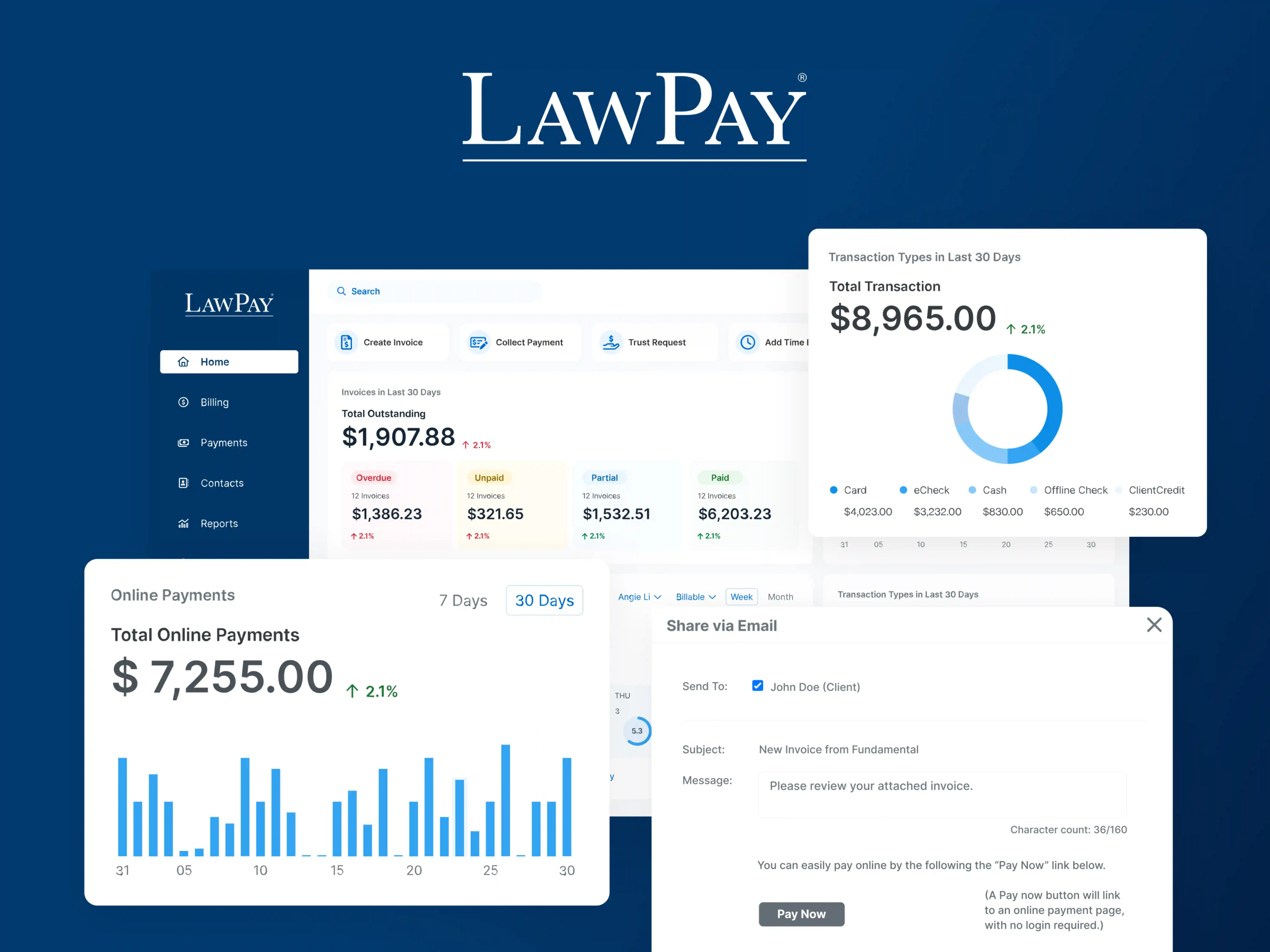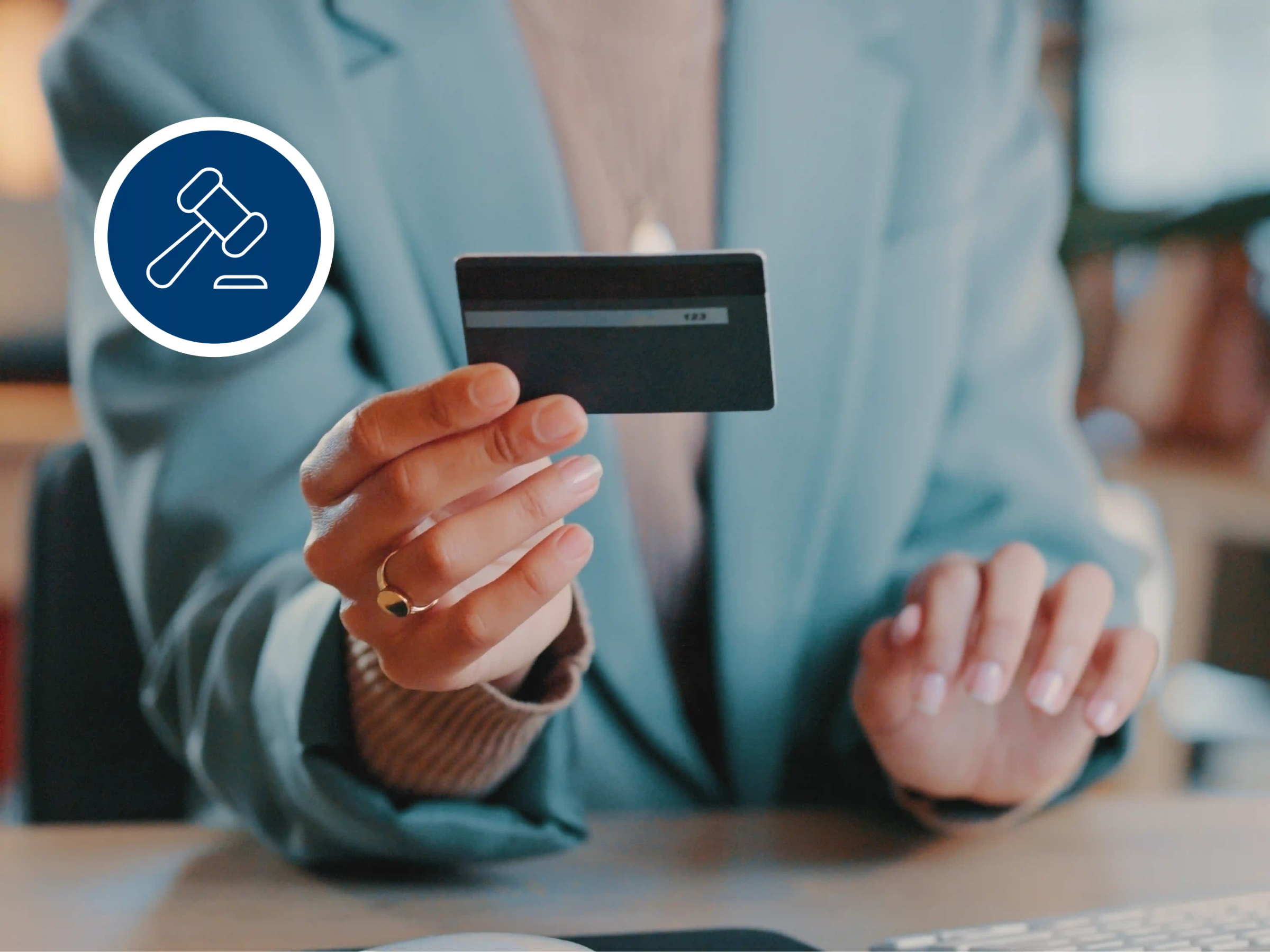These days, people are using online payments and credit cards to pay for nearly every type of product and service imaginable. Most people prefer the convenience that comes from paying instantly and from anywhere. Yet, many lawyers are lagging behind on offering modern billing options, stubbornly limiting payments to cash and paper checks.
There are plenty of reasons why this might be the case, from ethical concerns to a lack of technological know-how. Whatever the reason, one thing is abundantly clear: attorneys who don’t accept credit cards and other modern payment methods are missing vital opportunities to improve cash flow and meet client expectations.
Schedule a demo to see what LawPay can offer your firm.
Book Now
If your firm isn’t yet accepting credit cards, it’s not too late to start. Legal billing and payment software has made it easier than ever for attorneys to accept and manage payments online.
Do Lawyers Take Credit Cards?
Recently, there’s been an explosion in customer demand for credit card and online payments. This change in customer behavior has spurred on businesses in almost every industry to accelerate the implementation of digital payment options. During the COVID-19 pandemic, the adoption of digital payment reached an all time high and these days, people don’t just prefer paying for services on credit card, they expect it.
Because of the overall market shift towards digital payments, law firms that lag behind risk looking outdated or inefficient in the eyes of their clients. This is one of the many reasons that leading law firms across the country have started finding ways to modernize their billing and payment processes. In the past, the complexity of legal accounting regulation made it extremely difficult to implement online payment methods for law firms. Today, legal billing and payment software has changed that, and an increasing number of practices are already accepting credit card payments.
But why should lawyers take credit cards? Is making an investment in new technology worth it? Adopting convenient ways to pay online has a number of potential benefits for law firms, including:
More consistent cash flow
Better client experience
Simplified IOLTA compliance
Streamlined bookkeeping & A/R management
Helps future-proof law firm financial processes
7 Common Myths Around Lawyers Accepting Credit Cards
While credit card payments have been great news for most industries, some lawyers and other legal professionals are still hesitant to jump on the bandwagon for a variety of reasons. In truth, most of the justifications law firms cite for not adopting online payments are often outdated or misinformed. These are seven of the most common misconceptions about accepting credit cards online as payment for legal services (and why they’re wrong):
Myth 1: “Credit cards are too expensive.”
There’s no denying it—if you accept credit card payments for your services, you’ll have to deal with credit card processing fees. Today, more and more professionals accept that this is simply one cost of running a modern business. But ultimately, the benefits of faster payments and increased cash flow far outweighs the negligible processing fees associated with credit cards. Additionally, online payment methods for law firms help lawyers save time that would be spent on manual billing processes, allowing them to spend more effort on serving clients or achieving strategic goals.
Myth 2: “Online payments will only make my practice more complicated.”
While implementing new technology always has a learning curve, a specialized legal payment solution can actually help significantly simplify your billing and accounting practices in the long term. Better yet, top payment providers support integration with common accounting and case management software, meaning you can offer modern payment options without abandoning the workflows and processes that already work for you. Making payment easier and more convenient for clients can also make practices more efficient by eliminating a lot of manual tasks, like following up on payments and data entry.
But online payments offer more to law firms than added convenience alone. Specialized legal payment software also comes with many built-in features that help reduce financial complexity, such as tools to simplify reconciliation or automating account management to ensure compliance with IOLTA trust regulations.
Myth 3: “My clients don’t want to pay me with a credit card.”
In today’s market, more and more customers are shopping online for everything from clothes to paper towels to cars. Online payments are no longer limited to ecommerce giants and online shopping, but are increasingly part of people’s day-to-day life. A recent survey on consumer trends found that 74% of respondents said they preferred to pay with digital payment over traditional methods like cash or checks. That includes a rising number of older Americans who may have seemed resistant to payment technology in the past. The bottom line is that most people today prefer and expect to be able to pay by credit card, and not having that option can negatively affect how clients perceive your business.
Myth 4: “Credit cards are for retail, not for lawyers.”
The idea that credit cards are limited to use in retail is a bit of an outdated school of thought. Now, a growing number of industries and even government offices now offer digital payment in order to meet modern demand and expectations. This shift has been largely facilitated by a growing number of specialized payment providers that are designed to meet industry-specific standards and regulations.
For many years, a lack of payment providers specializing in legal finances meant that many lawyers had no realistic way of offering digital payments without opening themselves up to ethical concerns and compliance risk. That is simply no longer the case. Legal payment platforms like LawPay aren’t just configurable to work with law offices, but are built from the ground up to meet the unique needs of legal professionals and ensure IOLTA compliance.
Myth 5: “I don’t know enough about computers to accept online payments.”
Despite the numerous benefits of online payment options, you may feel you’re not tech savvy enough to implement an online payment system. But many leading payment systems are actually built with the user experience in mind and offer ongoing support to quickly solve any issues that might arise.
They’ll even walk you through the steps of setting up a payment page on your website, so your clients can easily pay your bill online at their convenience. After using LawPay for two years, attorney Deirdre O’Donnell told us that it “just takes the complexity of accepting credit cards right out of the process. We think it saves time for them and it certainly saves time for us. I think our collection rates have really improved since we've had LawPay.”
Myth 6: “Online credit card payments are unsafe.”
As a lawyer, you’re already well aware of how important it is to keep your clients’ sensitive personal information safe. While many people see online payments as less secure than a physical check, the opposite is true. Secure payment portals offer state-of-the-art encryption and security while eliminating the chance for client information sent in the mail or stored in an office to go missing or be intercepted.
When you choose a credit card processor, look for an online payment solution that’s Payment Card Industry (PCI) Level 1 certified—the highest designation possible. Modern payment solutions are well equipped to protect payment data and employ sophisticated security measures that your firm would otherwise not have access to. By letting your clients pay you through a secure online payment solution, you can take much of the liability of data security off your plate and place it in the hands of trusted security professionals. You’ll not only get a payment processor, but a payment data security specialist—all in one!
Myth 7: “I can’t accept credit cards and maintain IOLTA compliance.”
According to the ABA Modern Rules of Professional Conduct, lawyers must be careful to ensure earned funds are deposited into an operating account, while a client’s funds go to a trust account. When accepting cash, checks, or other traditional forms of payment, it’s simply a matter of depositing the funds in the right place, but how does this work when using a credit card?
This is how an online payment solution designed specifically for legal professionals can make credit card payments both easy and ethical. For example, when payments are made through LawPay, your earned and unearned fees are always separated and deposited into their proper accounts automatically. Legal payment platforms like LawPay also have built-in safeguards that prevent any third-party debiting to occur from your IOLTA account. Even unintentional misuse of client funds can have serious consequences. Using digital payments can reduce compliance risk by lowering the chances for human error that can lead to commingling funds.
Ethical Considerations for Lawyers Who Accept Credit Cards
Until relatively recently, the American Bar Association considered the payment of legal fees by credit card as unprofessional and ethically unacceptable. In 1974, that opinion was reversed, but for many in the legal industry the damage from the ABA’s original statement had already been done. The issue is further complicated by the fact that all 50 states have not reached a consensus on every aspect of using credit cards in law firms. Nuances aside, almost all jurisdictions explicitly support the use of credit cards in law firms generally. However, it’s still important to understand the potential ethical issues that can arise when accepting credit card payments from clients.
Using the right legal payment platform can drastically reduce the compliance risks and eliminate the ethical quandaries that surround digital payments. Here are a few of the ethical considerations to keep in mind when searching for a legal technology partner:
Client Confidentiality
Lawyers have steep ethical obligations to protect the confidential information of their clients. An attorney must take precautions to protect the confidential information they collect as part of payment, including storing credit card information. For most modern technology solutions, this responsibility falls on the payment platform itself - and the best ones come with the latest security features built-in so you don’t have to worry about it. Encryption, and other layers of added security, also ensure that in the worst case scenario of a data breach, your client’s information stays safe.
Beyond that, confidentiality extends to the descriptions of services provided to credit card processing companies. We recommend keeping descriptions general, but luckily many leading digital payment providers have other confidentiality safeguards built in.
Advance Payments
Setting up advanced payments with clients is a great tool to ensure higher collection and realization rates. However, taking retainers and other client funds in advance also presents a few technical dilemmas that may affect trust account compliance. For example, when a client pays a retainer via credit card, the retainer itself must be put into a trust, however the processing fees must come out of the operating account. Another (and rarer) issue could arise if a client disputes a charge, initiating a chargeback by the credit card company that might try and take funds back from a protected trust account.
Luckily, payment providers that specialize in legal payments offer many ways to avoid these issues entirely. For instance, processing fees can be set up to automatically come out of an operating account, ensuring that clients are only charged for billable hours. Payment partners can also make sure that any credit card chargebacks also come from the operating account, ensuring you never run into any ethical or compliance risks.
Recurring Charges
All states support the use of repeating charges in law firms. A recurring charge can take many forms, such as charging a client’s on-file credit card for an outstanding balance or automatically charging clients when work is completed. This also encompasses things like setting up flexible payment plans with clients. Regardless of the specific use case, the key to ethically setting up a recurring charge is giving clients advance notice of exactly when and how those charges will be made.
Payment Communication
There is one more important ethical consideration a law firm must make in addition to maintaining client confidentiality and trust compliance. Any attorney that accepts payments ethically by credit card must be proactive in communicating payment terms to clients well in advance.
Just like you would explain other aspects of legal representation to a client before any work begins, how and when a client’s credit card is charged should be laid out plainly then backed up with a written fee agreement. On top of this, a client and attorney should also agree on who is responsible for any credit card processing fees. In some cases, you may be able to add on a convenience fee or surcharge to cover it. However, some states expressly forbid a client from being responsible for these fees, so check it’s always best to consult with a legal expert first.
Start Accepting Credit Card Payments Today Using LawPay
Schedule a demo to see what LawPay can offer your firm.
Book Now
To stay competitive and attract new clients, law firms must find ways to modernize the client experience without adding complexity to their workflows and daily processes. Legal payment platforms like LawPay are designed from the ground up to enable law firms to offer simple, secure, and fully compliant digital payments to their clients. Trusted by thousands of legal professionals across the country, LawPay is transforming legal billing and accounting to help firms increase cash flow, streamline accounting, and improve the client experience.
To learn more about how LawPay can enable ethical credit card payments for your practice, schedule a demo today.
About the author

The LawPay Team
